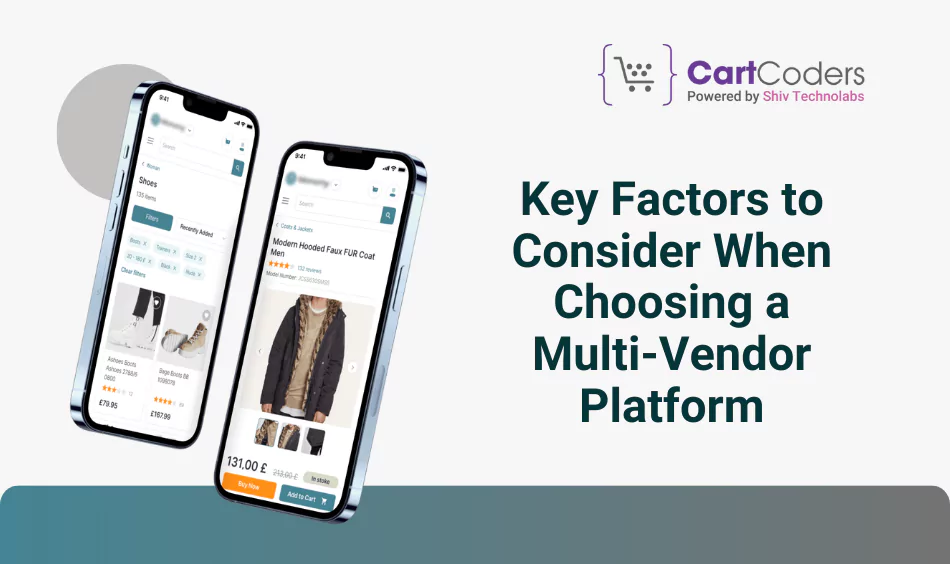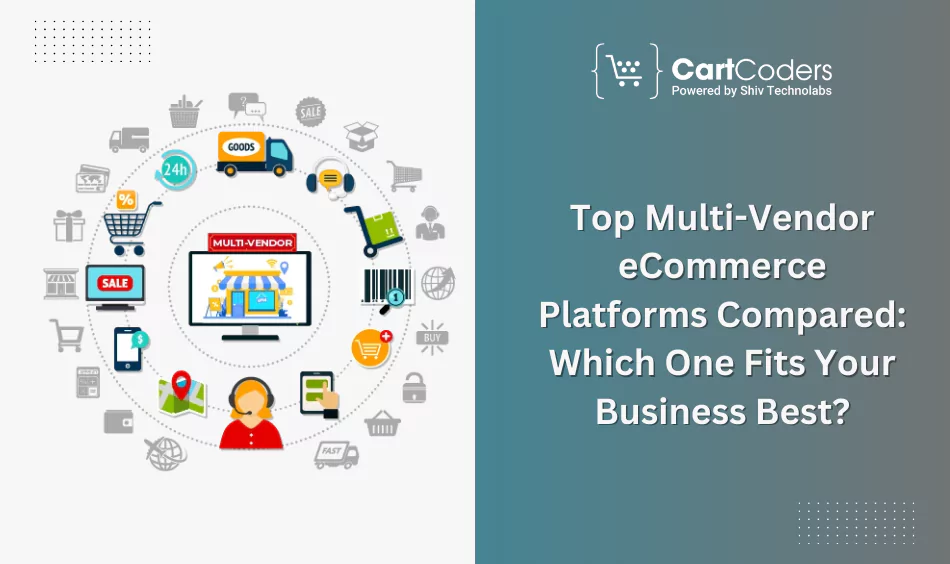Custom Engagement Solutions
Unlock tailored solutions with a free, no-obligation strategy session.
Expert Developers & Engineers on Demand
Scale Your Team with Skilled IT Professionals
Expert Guidance for Digital Transformation

A multi-vendor ecommerce platform allows multiple independent sellers to offer their products in one centralized online store. Each vendor manages their inventory, pricing, and shipping, while the platform owner oversees operations and customer relations. Businesses like Amazon and Etsy use this model, proving its effectiveness.
Selecting a reliable multi-vendor ecommerce solution is crucial for sustainable growth, as it directly affects user experience, vendor satisfaction, and operational efficiency. The right platform supports smooth expansion, attracts more vendors, and retains customers. This guide explains key factors to consider, comparisons between popular platforms, common mistakes to avoid, and provides practical advice for making informed decisions.
A multi-vendor ecommerce platform enables several independent sellers to list, sell, and manage products on a single website. Unlike single-vendor systems, multi-vendor marketplaces provide each vendor with their dashboard, product management, and sales tracking. Popular examples include Amazon, eBay, and Etsy.
The main attraction of these platforms is their ability to support diverse sellers without direct inventory management by the marketplace owner. This model reduces overhead costs and allows rapid growth. However, success depends on selecting the right multi-vendor ecommerce system tailored to business needs.

When selecting a multi-vendor platform, factors like ease of vendor onboarding, flexible payment systems, and platform scalability must be considered. Additionally, robust security features and customizable options for branding play important roles. These elements help in creating a stable, growth-oriented marketplace.
A scalable multi-vendor ecommerce platform is essential as your business grows. Increased traffic, larger product catalogs, and more vendors require robust systems. Scalability affects site speed, stability, and customer satisfaction. Ideal platforms should offer cloud hosting and handle large traffic volumes efficiently.
Efficient vendor management is crucial for multi-vendor marketplace platforms. Important features include simplified vendor registration, product approval systems, customizable dashboards for vendors, and automated commission tracking. Good vendor management reduces manual tasks and enhances operational efficiency.
Customization affects your brand identity and unique business needs. Multi-vendor ecommerce solutions differ widely in customization levels. Magento offers deep customization but requires technical expertise. Shopify, with themes and apps, provides easier customization for beginners. Always ensure the platform supports custom themes, extensions, and API integrations.
Also Read: Top 10 Best Shopify Multi-vendor Marketplace Apps
User experience directly impacts customer retention and sales. The multi-vendor marketplace platform must be user-friendly, responsive across devices, and visually appealing. Important UX elements include easy navigation, effective product searches, and smooth checkout processes.
Efficient payment and shipping processes enhance customer satisfaction. The best multi-vendor ecommerce platforms support multiple payment gateways, automate vendor payouts, and integrate reliable shipping services. Platforms must offer flexible shipping options and transparent payment processes.
Security is critical for any multi-vendor ecommerce system. Reliable platforms must protect customer and vendor data with SSL certificates, secure payments, fraud detection, and regular updates. Trustworthy security measures encourage vendor and customer confidence.
Pricing directly affects profitability. Costs for multi-vendor ecommerce platforms include subscriptions, transaction fees, hosting, and additional app charges. Transparent pricing models without hidden costs are essential. Always compare long-term costs for accuracy in an ecommerce platform comparison for multi-vendor marketplaces.
Also read: eCommerce Website vs eCommerce Marketplace: Which is Better?

Choosing the right multi-vendor ecommerce platform is crucial for businesses aiming to grow in the online marketplace sector. Several platforms are popular today, each offering unique advantages. Below is a detailed comparison of the top multi-vendor ecommerce platforms, helping you select the one that best fits your business requirements.
A Shopify multi-vendor marketplace allows multiple sellers to list and sell products through a single online store. It simplifies managing different vendors, product inventories, and payments in one place. This model helps store owners offer customers a wider product selection and boost revenue.
Best For:
Small to medium-sized businesses seeking an easy, reliable, and scalable multi-vendor ecommerce platform without heavy technical involvement.
Also Read: Why is Shopify Ideal for Your Multi-vendor Marketplace?
Magento is a leading open-source multi-vendor ecommerce system known for its flexibility, customization, and scalability. It’s a popular choice for large, complex marketplaces.
Best For:
Large businesses need a highly customizable, robust, and scalable multi-vendor marketplace platform with technical resources to manage complexities.
WooCommerce, built on WordPress, turns into a multi-vendor marketplace platform with plugins like Dokan, WC Vendors, and WCFM Marketplace. It’s popular for affordability and flexibility.
Key Features of WooCommerce
Best For:
Small businesses or startups looking for an affordable yet flexible multi-vendor ecommerce solution. Ideal for budget-conscious businesses willing to manage some technical tasks.
BigCommerce, similar to Shopify, isn’t natively multi-vendor but can be converted using apps like Webkul Multi-Vendor Marketplace. It’s known for built-in features, excellent scalability, and advanced multi-channel selling capabilities.
Best For:
Mid-sized businesses seeking robust built-in features, strong multi-channel selling capabilities, and scalability similar to Shopify but with fewer third-party apps.
Also Read: Shopify Plus vs. BigCommerce: Choosing the Right eCommerce Platform
CS-Cart is a dedicated multi-vendor ecommerce platform built specifically for creating marketplaces. It’s packed with out-of-the-box features, reducing additional plugin costs.
Best For:
Medium-sized businesses want a dedicated, feature-rich, multi-vendor ecommerce platform with minimal reliance on third-party integrations.
Ultimately, the best multi-vendor ecommerce platform depends on your business size, technical capabilities, growth plans, and budget. This detailed comparison provides the clarity needed to make an informed decision aligned with your goals.
Also Read: Shopify Multi-Vendor Marketplace: Pros and Cons
Selecting the right multi-vendor ecommerce platform is critical for success. However, many businesses unknowingly make costly mistakes during this process. Below are common pitfalls to avoid, along with practical advice on making informed decisions.
Many businesses select a multi-vendor ecommerce platform solely based on popularity or market trends without evaluating if it matches their specific requirements. Popular platforms may not necessarily meet every business’s unique needs or goals.
How to Avoid:
Some businesses overlook scalability, assuming their chosen multi-vendor ecommerce solution will grow alongside their business effortlessly. However, a lack of scalability can lead to site crashes, slow loading times, and poor customer experiences when traffic increases.
How to Avoid:
Effective vendor management is essential for a multi-vendor marketplace platform. Businesses often underestimate the importance of efficient vendor onboarding, commission handling, and product management tools. Poor vendor management can lead to operational inefficiencies and vendor dissatisfaction.
How to Avoid:
Some businesses choose platforms lacking the necessary customization options. Rigid platforms hinder branding and adapting to evolving market needs. Limited flexibility makes future changes difficult and expensive.
How to Avoid:
Businesses often focus only on initial setup costs, neglecting hidden or ongoing expenses like transaction fees, hosting, additional apps, maintenance, and platform upgrades. Unexpected costs affect profitability and sustainability.
How to Avoid:
Also Read: Go From Scratch to Success – Build a Multi-Vendor Marketplace Today
User experience directly affects customer retention and sales. Businesses ignoring UX face higher bounce rates, abandoned carts, and lower customer loyalty. Slow sites, confusing navigation, and poor mobile compatibility harm performance.
How to Avoid:
Security is often underestimated. Choosing a platform lacking robust security exposes businesses to risks like data breaches, fraud, and damaged reputations. Weak security measures erode customer and vendor trust.
How to Avoid:
Some businesses neglect how a platform handles payment and shipping integrations. Inadequate integration leads to manual processes, payment delays, shipping errors, and dissatisfied customers.
How to Avoid:
Businesses sometimes select a multi-vendor ecommerce platform without proper testing, later discovering unforeseen limitations. Problems found post-launch can be costly and time-consuming to fix.
How to Avoid:
Avoiding these common mistakes when choosing a multi-vendor ecommerce platform sets a solid foundation for success. Thorough research, detailed testing, and careful evaluation ensure your chosen platform meets your business needs effectively. With proper planning, you can confidently select a reliable multi-vendor ecommerce solution that supports sustainable growth and ongoing success.
Also Read: How Much Does it Cost to Launch A Shopify Marketplace: A Guide to Startup Costs
CartCoders is recognized globally as a leading Shopify marketplace development company committed to delivering exceptional multi-vendor solutions. Our skilled developers specialize in creating fully customized Shopify marketplaces that drive business growth and increase vendor satisfaction.
We understand the complexities involved in managing a successful marketplace, which is why our services cover every aspect, from intuitive vendor management tools and streamlined payment solutions to efficient shipping integrations.
By partnering with CartCoders, you gain:
Our consistent delivery of high-quality and results-driven Shopify solutions has earned us the trust of numerous successful businesses worldwide.
Choosing a reliable multi-vendor ecommerce platform directly affects your business growth. The right platform should align with your business size, budget, vendor management needs, and scalability requirements. Whether you prefer Shopify for ease of use, Magento for advanced customization, or WooCommerce for affordability, careful evaluation is essential.
For businesses seeking simplicity, scalability, and expert support, CartCoders is a trusted Shopify marketplace development partner. CartCoders specializes in creating customized, reliable Shopify multi-vendor marketplaces that drive sustainable growth. By leveraging our expertise, you can confidently build a marketplace tailored to your needs.
Projects delivered in 15+ industries.
95% retention rate, building lasting partnerships.
Serving clients across 25+ countries.
60+ pros | 10+ years of experience.